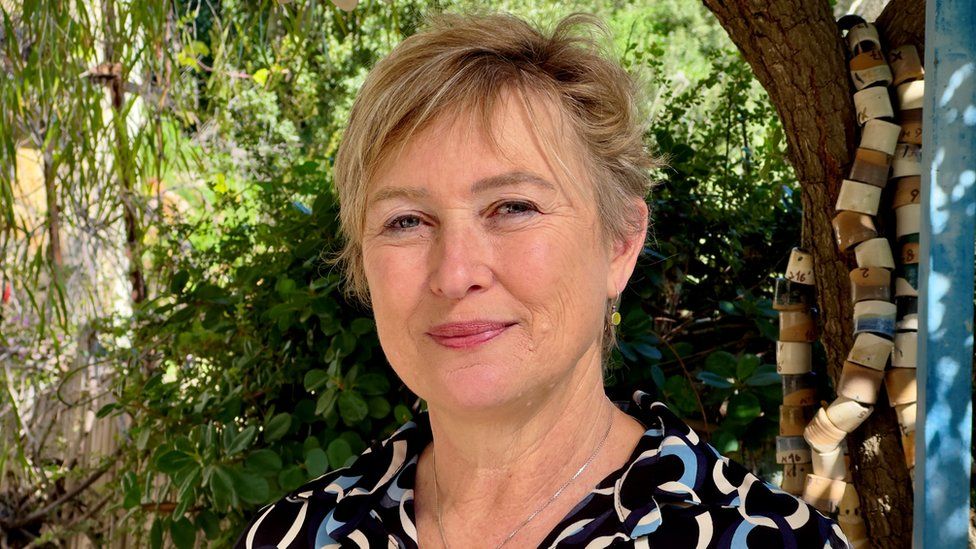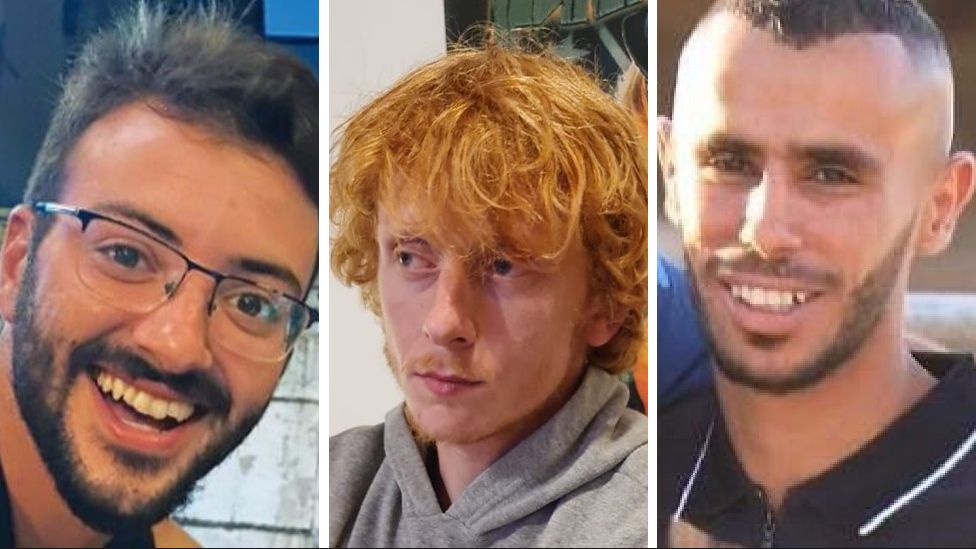
By Lucy Manning
Special Correspondent, BBC News
Iris Haim told BBC News that recent videos of hostages who appeared to be dead were intended to turn Israelis against their government to “try and make us weak”.
A video released by Hamas on 15 January appears to show the bodies of two hostages, Yossi Sharabi and Itay Svirsky.
On Tuesday evening, the death of both men was confirmed in a statement from Kibbutz Be’eri and the Hostages and Missing Persons Families Forum.
It said their bodies were still being held by Hamas, and requested their return.
Yossi Sharabi’s brother Eli was also kidnapped on October 7 and is still being held hostage. Eli’s British-Israeli wife, Lianne, and daughters, Noiya and Yahel Sharabi, were murdered by Hamas.
Itai Svirsky’s parents, who he was visiting at the kibbutz, were both murdered in the attack.
Hamas said the two had been killed by air strikes. But in the deaths of other hostages which the group has blamed on air strikes, Israeli forensic officials say post-mortems on the bodies do not support this.
The video was narrated by a third hostage, Noa Argamani. Her fate is not known.
Mrs Haim’s own son Yotam was killed along with two other Israeli captives, Alon Shamriz and Samer Talalka on 15 December. All three were captured by Hamas gunmen during the group’s attack on Israel on 7 October, which killed around 1,300 people, mostly civilians.
Over 24,000 Gazans have also been killed – most of them women and children – in the Israeli bombardment since then, according to the Hamas-run health ministry. Israel says more than 9,000 of those it has killed were Hamas fighters.
Yotam and the other two men are believed to have escaped into an empty building close to Israeli army positions. An official investigation found that the men had used food to write the words “SOS” and “Help, 3 Hostages” on a sheet to try and alert soldiers to their presence.
“He and his friends were leaving captivity,” Mrs Haim says with pride.
Israeli soldiers suspected a Hamas trap and did not enter. Later, the hostages exited the building, shirtless and waving a makeshift white flag. But an Israeli sniper opened fire on them. Yotam was wounded, the other two men killed on the spot.
According to the Israel Defense Forces (IDF), a command was given to hold fire and Yotam was told to come forward. But one of the soldiers shot nonetheless, killing him. According to the official investigation, the soldier didn’t hear the order because of noise from a tank.
“We were really sorry and disappointed, of course, because just a week before [his death] we had heard that he was okay.”
- Stories of the hostages taken by Hamas from Israel
- The man held with the hostages Israel mistakenly killed
Days after, Iris Haim recorded a message to the soldiers who killed her son, telling them she did not see his death as their fault. Speaking through tears, she explains her decision. “What happened, happened … we have enough suffering here,” she said. “These soldiers also have families and mothers. I was also worried for them.”
“We felt that we cannot be angry, because they were Israeli forces,” she added.
She is clear about who she blames for her son’s death: “Hamas, just Hamas. Hamas is in charge of all of this.”
Her reaction contrasts with that of Alon Shamriz’s family. At his funeral, his brother Ido blamed the Israeli government for his kidnapping and death, saying: “The one who abandoned you also murdered you.”

When I last met Mrs Haim in November, she was in London to raise the plight of the hostages with the international community. She told me then she still had hope that her son would return alive.
Yotam and the two other slain hostages were held with Wichian Temthong, a Thai migrant worker. Mr Temthong, who was released as part of a separate deal with Hamas, has recalled how Yotam, a drummer for a heavy metal band named Persephore, would tap out rhythms with his hands to distract himself.
His mother takes comfort from this. “He was a keeping his spirits high, even in a dark place like Hamas captivity. He survived for 70 days in very hard conditions,” she says.
Yotam’s brother is also a drummer, playing in the band of Israeli singer Netta Barzilai, the winner of the 2018 Eurovision Song Contest. At Yotam’s funeral, she sang a Metallica song.

Around 130 of the estimated 240 people taken to Gaza from Israel are believed to still be held by the group, after around half were released in November. Mrs Haim believes that “time is running out” for the remaining hostages, even if “Israel is doing its best to free” them.
She expresses worry for them. “There is no food [for the hostages] in Gaza now, that’s what I understand. Many old people don’t get medicine. We don’t know who is alive.”
For Yotam, it is too late. But she would like the world to know that in her eyes, he died a hero.
“He ended his life a free person.”https://blejermot.com/